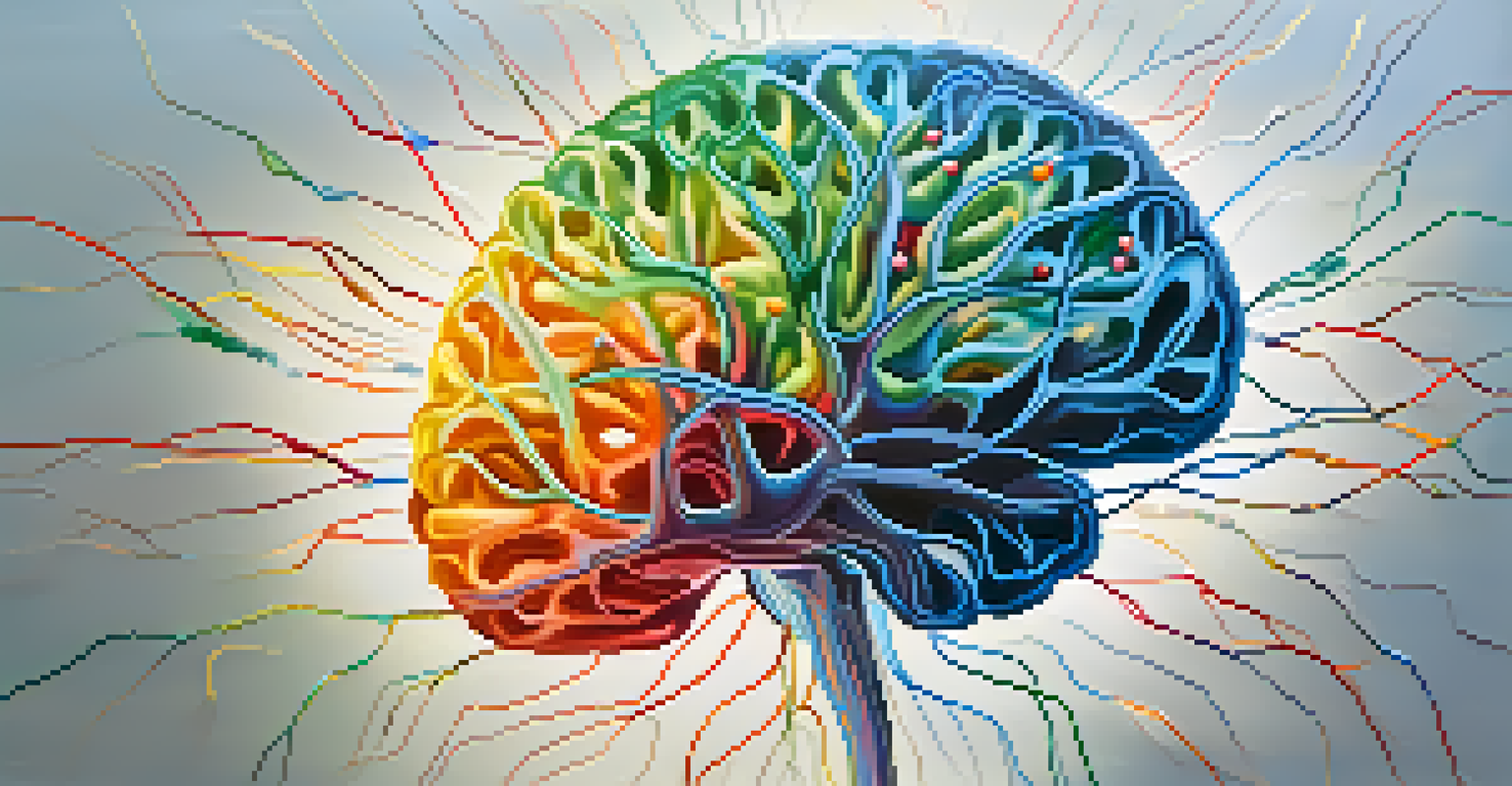The Intersection of Entheogens and Modern Psychology

Understanding Entheogens: A Brief Overview
Entheogens are substances that have been used for centuries in various cultures for spiritual and therapeutic purposes. Often derived from plants or fungi, these compounds can elicit profound experiences that many believe connect them to a greater consciousness. In modern times, the interest in entheogens has surged, particularly within psychological and therapeutic settings.
Psychedelics can help us see the world in a different way. They can help us break free from our old patterns and find new paths forward.
While their historical use is well-documented, the contemporary exploration of entheogens is gaining traction, especially in the realms of mental health treatment. Psychedelics like psilocybin and ayahuasca are now being studied for their potential to alleviate conditions such as depression and PTSD. This revival raises questions about the intersection of ancient practices and modern scientific approaches.
As researchers dive deeper into their effects, a fascinating dialogue is emerging about the potential benefits and risks of these substances. Understanding both the historical context and the current scientific exploration is crucial to grasping how entheogens might reshape modern psychology.
Historical Context of Entheogens in Healing
Throughout history, various cultures have embraced entheogens as sacred tools for healing and self-discovery. Indigenous tribes in the Amazon have long used ayahuasca in ceremonial settings to promote emotional and spiritual healing. These practices highlight the deep-rooted belief in the transformative power of entheogens, often regarded as a bridge to the divine.

In addition to South America, cultures across the globe have incorporated similar substances into their healing rituals. For instance, the use of peyote by Native Americans and the Soma of ancient India showcase the diverse applications of entheogens in promoting mental clarity and emotional release. This historical usage sets the stage for understanding their potential in contemporary psychological practices.
Entheogens Enhance Mental Health Treatment
Research indicates that substances like psilocybin and ayahuasca show promise in alleviating mental health conditions such as depression and PTSD.
As modern psychology begins to recognize the benefits of these ancient practices, a blend of tradition and innovation emerges. The challenge lies in respecting these cultural roots while integrating entheogens into evidence-based therapies.
The Science Behind Entheogens and the Brain
Research into how entheogens affect the brain is both exciting and enlightening. Studies suggest that substances like psilocybin can increase neuroplasticity, allowing the brain to form new connections and potentially leading to lasting changes in thought patterns. This mechanism is pivotal in treating various mental health disorders, as it may help individuals break free from entrenched negative thinking.
The use of entheogens has the potential to catalyze profound personal transformation and healing, reflecting ancient wisdom in contemporary settings.
Moreover, entheogens often induce altered states of consciousness, which can facilitate emotional breakthroughs. For many, these experiences allow for a reevaluation of personal beliefs and traumas, fostering a sense of healing. By combining these altered states with therapeutic guidance, patients may find new pathways to understanding themselves.
However, it's essential to approach this science with nuance. While the potential benefits are promising, more research is needed to ensure safe and effective use within therapeutic contexts, particularly regarding dosage and individual differences.
Psychedelic Therapy: A Modern Approach
Psychedelic therapy is an emerging field that integrates traditional therapeutic practices with the use of entheogens. This approach often involves a trained therapist guiding a patient through their experience, creating a safe space for exploration and healing. By blending psychotherapy with the profound insights gained from entheogens, individuals may achieve deeper emotional processing.
Clinical trials have shown that psychedelic therapy can lead to significant reductions in symptoms for conditions like depression and anxiety. The therapeutic setting helps anchor the experience, allowing individuals to confront and work through their emotions with professional support. This model highlights the importance of structure and safety in harnessing the power of entheogens.
Cultural Roots Inform Modern Therapy
The historical use of entheogens in various cultures highlights their potential in contemporary psychological practices while emphasizing the need for ethical considerations.
As this field continues to evolve, ethical considerations and regulatory frameworks are becoming increasingly important. Ensuring that these therapies are administered responsibly will be crucial for their acceptance and integration into mainstream psychology.
Potential Risks and Ethical Considerations
While the benefits of entheogens are gaining recognition, it's vital to acknowledge the potential risks involved. Not everyone will have a positive experience, and some individuals may encounter overwhelming emotions or psychological distress during their journeys. For this reason, thorough screening and preparation are necessary to identify those who may be at risk.
Additionally, the ethical implications of using entheogens in therapy cannot be overlooked. Issues such as informed consent, cultural appropriation, and the commodification of sacred practices are critical discussions in the field. Acknowledging these concerns will be essential in fostering responsible use and ensuring that the therapeutic potential of entheogens is respected.
As the dialogue surrounding entheogens evolves, establishing clear ethical guidelines will help protect both practitioners and patients. The goal should be to enhance mental health treatment while honoring the cultural significance of these substances.
The Role of Set and Setting in Entheogen Experiences
The concept of 'set and setting' is crucial in understanding how entheogens affect individuals. 'Set' refers to a person's mindset, including their expectations and emotional state, while 'setting' encompasses the physical and social environment in which the experience occurs. Both factors significantly influence the outcome of an entheogen experience, impacting everything from emotional safety to the depth of insights gained.
In therapeutic settings, careful consideration of set and setting can enhance the efficacy of the experience. Creating a supportive atmosphere and preparing individuals mentally can lead to more profound and positive outcomes. This understanding is vital for therapists working with entheogens, as it emphasizes their role in facilitating a safe space for exploration.
Set and Setting Impact Experiences
The mindset and environment surrounding entheogen use significantly affect the outcome of therapeutic sessions, underscoring the importance of creating supportive settings.
As interest in entheogen-assisted therapies grows, acknowledging the impact of set and setting will be essential for practitioners. By prioritizing these elements, therapists can help individuals navigate their journeys more effectively, promoting healing and self-discovery.
Future Directions: Entheogens in Mental Health Treatment
The future of entheogens in mental health treatment looks promising, with ongoing research paving the way for new therapeutic applications. As more studies validate their efficacy, we may see a shift in how mental health issues are approached, moving away from traditional pharmaceuticals to more holistic methods. This could lead to a broader acceptance of entheogens in clinical settings.
Moreover, the integration of entheogens into mainstream psychology could foster a more comprehensive understanding of mental health. By combining traditional therapeutic practices with the insights gained from entheogens, practitioners may develop more effective treatment plans tailored to individual needs. This holistic approach emphasizes the importance of viewing mental health from multiple angles.

However, this future also requires a commitment to ethical practices and thorough research. As we explore the potential of entheogens, maintaining a focus on safety and responsibility will be crucial for their successful integration into mental health treatment.